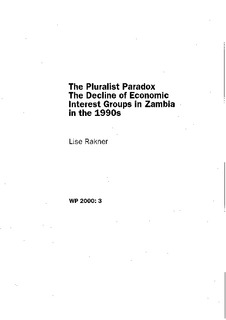| dc.contributor.author | Rakner, Lise | |
| dc.date.accessioned | 2008-02-27T11:45:30Z | |
| dc.date.accessioned | 2017-03-29T09:12:48Z | |
| dc.date.available | 2008-02-27T11:45:30Z | |
| dc.date.available | 2017-03-29T09:12:48Z | |
| dc.date.issued | 2000 | |
| dc.identifier.isbn | 82-90584-54-7 | |
| dc.identifier.issn | 0804-3639 | |
| dc.identifier.uri | http://hdl.handle.net/11250/2435940 | |
| dc.description.abstract | The dilemma facing new democracies attempting to implement political and economic reform simultaneously is that democratisation may undermine economic reform by encouraging political participation and empowering interest groups that are unlikely to benefit from reform. This paper compares interest group - government relations under one-party and multiparty rule in Zambia. Contrary to the assumptions of pluralist theory, the paper argues that the influence of interest groups declined as a result of political and economic liberalisation. The evolution of electoral politics resulted in the proliferation of civic associations and the weakening of corporatist links between the state and economic interest groups that had been granted some real influence in the previous authoritarian regime. This 'pluralist paradox' has meant, at least in the initial phases of multi party ru le, that interest group resistance do not constitute a significant threat to the sustainability of the reform programme, nor the electoral prospects of MMD. | |
| dc.language.iso | eng | |
| dc.publisher | Chr. Michelsen Institute | |
| dc.relation.ispartofseries | CMI Working paper | |
| dc.relation.ispartofseries | WP 2000: 3 | |
| dc.subject | Democratization | |
| dc.subject | Interest groups | |
| dc.subject | Economic reform | |
| dc.subject | Politics | |
| dc.subject | Zambia | |
| dc.title | The Pluralist Paradox. The Decline of Economic Interest Groups in Zambia in the 1990s | |
| dc.type | Working paper | |
